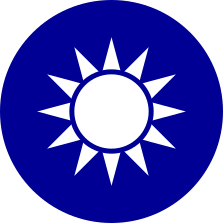Pan-Green Coalition
The pan-Green coalition, pan-Green force or pan-Green groups is a localist political coalition in Taiwan (Republic of China), consisting of the Democratic Progressive Party (DPP), Taiwan Statebuilding Party (TSP), Taiwan Solidarity Union (TSU), Taiwan Independence Party (TAIP), and Taiwan Constitution Association (TCA). The platform of the New Power Party is also very closely aligned with all the other Pan-Green parties.[1][2][3]
| Pan-Green coalition | |||||||||||
|---|---|---|---|---|---|---|---|---|---|---|---|
| Traditional Chinese | 泛綠聯盟 | ||||||||||
| Simplified Chinese | 泛绿联盟 | ||||||||||
| |||||||||||
| Pan-Green force | |||||||||||
| Traditional Chinese | 泛綠軍 | ||||||||||
| Simplified Chinese | 泛绿军 | ||||||||||
| |||||||||||
| Pan-Green groups | |||||||||||
| Traditional Chinese | 綠營 | ||||||||||
| Simplified Chinese | 绿營 | ||||||||||
| |||||||||||
History
The name comes from the colours of the Democratic Progressive Party, which originally adopted green in part because of its association with the anti-nuclear movement. In contrast to the Pan-Blue Coalition, the Pan-Green Coalition favors Taiwanization and Taiwan independence over Chinese reunification, although members in both coalitions have moderated their policies to reach voters in the center.
This strategy is helped by the fact that much of the motivation that voters have for voting for one party or the other are for reasons that have nothing to do with relations with China. This is particularly true among swing voters. For much of the 1990s the parties which later formed the Pan-Green Coalition greatly benefited because they were less corrupt than the ruling Kuomintang (KMT). However, due to the controversies and the alleged corruption cases involving the former DPP nominated President Chen Shui-bian, the public perception of the Coalition is seemed to have been altered somewhat.
The Pan-Green Coalition formed in the aftermath of the 2000 presidential election, after which Lee Teng-hui was expelled from the Kuomintang and created his own party, the Taiwan Solidarity Union, which maintains a pro-independence platform.
The internal dynamics of the Pan-Green Coalition are different from those of the Pan-Blue coalition. Unlike the Pan-Blue coalition, which consists of relatively equal-sized parties with very similar ideologies, the pan-green coalition contains the DPP, which is much larger and more moderate than the TSU. So rather than coordinating electoral strategies, as in the case of the parties within the Pan-Blue coalition, the presence of the TSU keeps the DPP from moving too far away from its Taiwan independence roots. In local elections competition tends to be fierce between Pan-Green candidates from different parties and, as a rule, joint candidates are not proposed.
The Green Party Taiwan is not to be considered as part of the Pan-Green Coalition, however the Green Party has similar views with the Democratic Progressive Party especially on environmental and social issues and the Green Party are also allied with Social Democratic Party.
See also
External links
References
- "【政治事】時代力量十席「緊箍咒」 套到民進黨". Archived from the original on 2015-12-08. Retrieved 2015-12-08.
- 黃國昌:需承諾共推重要改革
- 超越藍綠?台灣社運型政黨前進立法院
